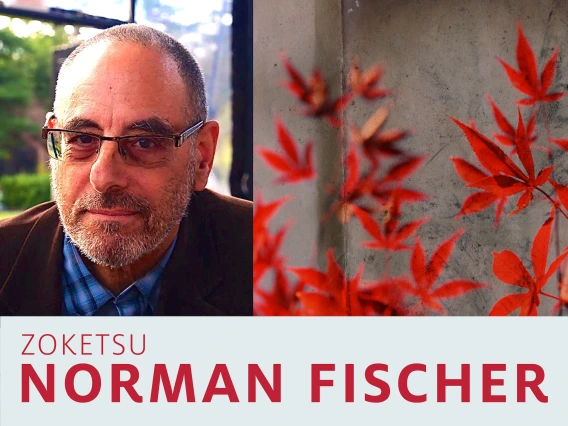
The UA College of Humanities presents Zoketsu Norman Fischer — poet, author, essayist, translator, cultural critic, former coabbot of the San Francisco Zen Center, founder of Everyday Zen, and one of the leading contemporary teachers and voices of Buddhism in America.
Fischer will conduct a public reading and discussion on Friday, Feb. 16 at 7 p.m. in the UA Poetry Center. Additionally, Fischer will also be conducting a creative writing workshop and two sessions of sitting meditation with dharma talks. See the full schedule below.
FRIDAY, FEBRUARY 16, 7:00 PM | POETRY READING & DISCUSSION
UA Poetry Center, 1508 E. Helen St. FREE & OPEN TO THE PUBLIC
FRIDAY, FEBRUARY 16, 3:30–4:30 PM | COLLOQUIUM
East Asian and Buddhist Studies, Copper Room, UA Memorial Student Union
SATURDAY, FEBRUARY 17, 9:30–11:30 AM* | CREATIVE WRITING WORKSHOP AND DISCUSSION. Tucson Osteopathic Foundation, 3182 N. Swan Road
SATURDAY, FEBRUARY 17, 1:30–5 PM* | MEDITATION SIT AND DHARMA TALK sponsored by Tucson Upaya Sangha. Tucson Osteopathic Foundation, 3182 N. Swan Road
*BOTH events are free to UA students with ID. Open to the public, $20 suggested donation. No one turned away for lack of funds. Pre-registration is required, contact: tucsonupayasangha@gmail.com
SATURDAY, FEBRUARY 17, 7:30 PM | POETRY READING. Fischer reads with poet and University professor Tenney Nathanson, sponsored by POG.
Steinfeld Warehouse, 101 W. Sixth Street. $5 admission, $3 students.
Author of more than 25 books of poetry and nonfiction, Fischer has also published articles, essays, and poems in a wide variety of publications. He served as director and co-abbot of Green Gulch Farm Zen Center from 1981-2000, and as co-abbot of the San Francisco Zen Center from 1995–2000. During his abbacy, Fischer supported the research, drafting and formal institution of a women’s lineage chant, alongside the traditional men’s lineage chant, during services. Later he supported the drafting of an official women’s lineage paper—the first female lineage document in the history of any major world religion—which traces the line of women practitioners from the Buddha’s time to the present and recognizes the important historical role of the Zen women ancestors. During these years, working with others, he founded Zen Hospice Project, whose board he chaired for 20 years. He has presented work and given talks and lectures on meditation and mediation, in venues ranging from The Oprah Winfrey Show to corporate boardrooms to abbeys and Buddhist sanghas around the world.
Fischer founded the Everyday Zen Foundation in 2000, a network of Buddhist practice group and related projects in Canada, the United States and Mexico that combines in-person lectures, dharma talks, and sitting meditation with online resources http://www.everydayzen.org/. Among his best known works are Taking Our Places: The Buddhist Path to Truly Growing Up; Training in Compassion: Zen Teachings on the Practice of Lojong; Sailing Home: Using Homer’s Odyssey to Navigate Life’s Perils and Pitfalls, and Opening to You: Zen-Inspired Translation of the Psalms.
Fischer’s visit is sponsored by the University of Arizona College of Humanities. Cosponsoring University organizations include the Department of Religious Studies and Classics; the Institute for the Study of Religion and Culture; the University of Arizona Poetry Center; the Department of English; Arizona Quarterly; the Institute of the Environment; the Department of East Asian Studies; and the Center for Buddhist Studies. Other University supporters include the Creative Writing Program and the Center for Compassion Studies. Cosponsoring community organizations include Upaya Sangha; POG (Poetry and Arts of Tucson); Desert Rain Zen; and Sky Island Zen.

